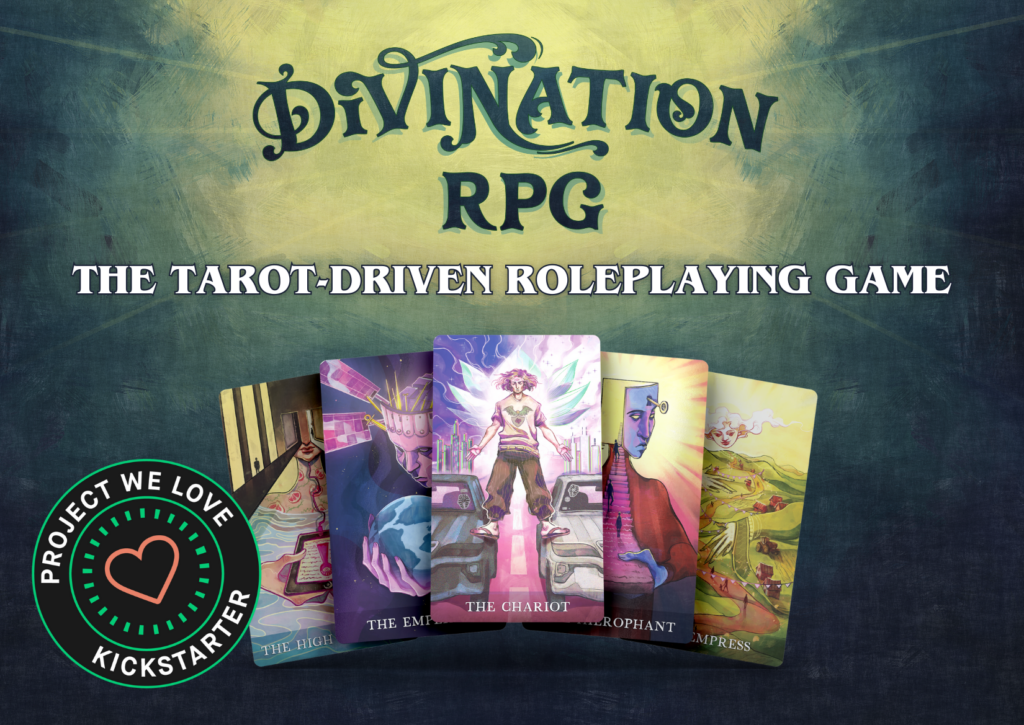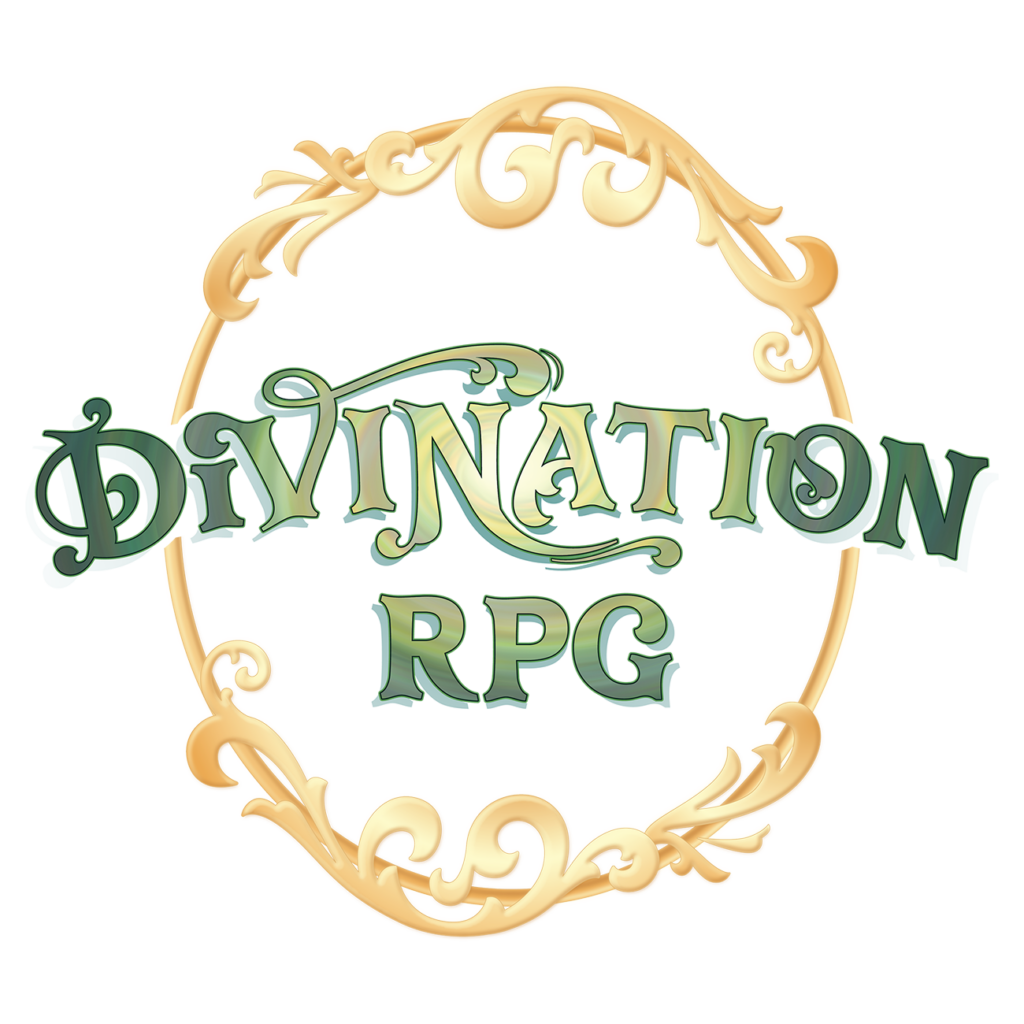Tag Archives: NightGoddessGames
Creator Spotlight | An Interview with the Creators of Divination RPG
Divination RPG offers a transformative approach to tabletop roleplaying, merging the ancient tradition of tarot with the dynamic mechanics of RPGs. This game invites players to embark on a journey of self-discovery and adventure, navigating a world where the flip of a card determines fate.
In this exciting interview, we delve into the minds of the creators behind this innovative game, Matthew Muñiz and Nyx Tesseract, to uncover the inspiration, mechanics, and future for Divination RPG. Join us as we explore the fascinating world where destiny is woven with each card drawn, and where players become active participants in an unfolding narrative guided by the very tools of divination.

Don’t just consult the cards, adventurers! Support the Divination RPG Kickstarter!
What initially drew you to incorporating tarot into an RPG experience?
I’ve always used tarot as a part of my TTRPG ventures, I think. It’s been an idea generator, a generator for NPC motivations—a set of huge, abstract symbols from which to draw. So as I ran D&D games growing up, and later, World of Darkness games, I liked to use tarot to get ideas about plots, motivations, antagonists, worlds of magic, all kinds of stuff. I got my first Pixie (RWS) deck in my teenage years, and started running games for my friends right around the same time.
Matthew Muñiz
Were there influences other than tarot that served as inspiration for the game’s mechanics?
I loved the World of Darkness games from the 90s, and grew up on Basic and Advanced D&D—a childhood inheritance from my erstwhile-nerd parents. I liked how WoD games let you develop your character without levels (I recall that as revolutionary once upon a time, way back when). Those worlds also aspired to delve into the psychology involved in role-playing and character development. I think of those games as blazing a trail that now lots of other narrative-first games follow.
Some of those, like Bluebeard’s Bride and Kids on Bikes, use shared hero and shared character dynamics that really influenced Divination as well. As roleplaying games explore GM-lessness, elements of shared storytelling are becoming increasingly common, and I think those mechanics work beautifully in Divination because it’s based on tarot. Tarot is so much about introspection and personal growth, and so a game where the parts of the mind negotiate that (and sometimes fight over it) suits our world really well.
Matthew Muñiz

Can you walk us through the core mechanics of Divination RPG?
There are two main mechanics that make up the heart and soul of playing Divination. One is the shared Hero that Matthew mentioned, and the second is the performance of Tests.
You play Divination as one Aspect of a Hero, and your fellow players are also Aspects of that same Hero. Each Aspect embodies one set of drives and desires inside that person, which adds an additional element to roleplay. Sometimes one Aspect is in Control of the Hero and is navigating the world and dealing with NPCs just like any other roleplaying game, but at other times we zoom in to the internal and see the conversations happening between the Aspects—the Hero’s internal thoughts and conflicts and questions playing out live. Each player has an Aspect sheet which tracks the stats and abilities unique to them as an individual, and collectively the players share a Hero sheet which tracks the stats available equally to all of them.
Where all those different stats and abilities come in brings us to the other core mechanic of Divination: the Test. This is essentially your skill check, but it’s resolved by drawing a tarot card instead of rolling a d20. We use one portion of the tarot deck that contains numbered cards only, and draw a card to get a numerical result (after applying modifiers to reflect difficulty, stats, and Powers, of course). The number gives a clear success or failure, but the scene depicted on the card and the meaning of the card is rolled into the how of that success or failure as well.
Tests can be Active when the Hero is proactively acting on the world, or Passive when they need to respond to the forces of the world acting upon them.
Nyx Tesseract
How do you envision the concepts in Divination RPG fitting into the broader world of tabletop RPGs?
One of the things I’m personally most excited about is the way Divination handles the Hero’s experience of being hurt both physically and emotionally. We’ve separated this experience into Injury, which happens to the body, and Harm, which happens to the mind or the psyche. I don’t want to spoil too much of what you can discover playing the game, but I think we offer the opportunity for players to explore a lot of nuance in what it means to be hurt. This is something we’re really excited about offering to the gaming community at large, because I don’t think either of us has seen it handled or delved in quite this way before.
And I mean, it’s so tarot. It’s so tarot to explore every element of our human experience, the good and the bad, through a lens of non-judgmental curiosity.
Nyx Tesseract
How does interpreting the cards impact the gameplay and decision-making process for players?
The beautiful thing about Divination is that it’s both numeric, which means it can do the things that dice can do, and it’s pictorial, which means it speaks in the fuzzy, flexible language of pictures. When a Test is read, it does more than just tell the players whether or not they were successful at whatever they were trying to do—it can also suggest why. This almost always amounts to thoughts and feelings that influence the moment, but a Diviner is invited to weave the meanings they read in the cards into the story in any way that inspires them. This makes for emotional, profound moments where everyone is surprised by what they discover in the cards. I know we keep saying this, but it’s so tarot.
Matthew Muñiz
What challenges did you encounter while designing a system that incorporates both numerical crunch and interpretation of tarot cards?
It’s challenging to offer people permission to interpret tarot cards. People think they have to memorize long lists of meanings, but in my opinion, all you have to do is look at a picture and allow it to make you feel something. In Divination, we divide the tarot deck into smaller decks to make it easy to do this. The mechanical crunch is fairly easy, with +1s and -1s like other games.
You really just have to trust that you’ll look at a picture and seize the opportunity to be creative with what you see—or give yourself permission to skip that part when you want! You don’t have to interpret any moment that doesn’t make sense to you. A joy of Divination is allowing a symbol to persist and coming to understand what it means later.
Matthew Muñiz

Besides tarot’s role in the mechanics, how does tarot exist in the world and society of the game?
Tarot is baked into every part of our setting, which imagines two worlds: the Apparent and the Esoteric. The Apparent is the mundane world we all inhabit, and the Esoteric is the one populated by Artists—modern wizards who use the tarot and their unique connections to the Art to pursue their agendas.
These Artists each walk a Road that dictates what their connection to the Art is like. There are seven Roads in total, and each is wildly different. In Divination, you’ll make a single Hero on a single Road, so you get incredible replayability from our game as you explore all seven Roads. Each Hero on an Esoteric journey will be a part of a rich world full of competing agendas and surprises, all drawn from tarot.
Matthew Muñiz
What has been the community’s response to Divination RPG so far?
We’ve been just blown away by the way Divination seems to really touch every single person that touches it. I think the shared Hero is a huge part of that, and particularly the way the game builds that Hero. Our character creation process isn’t something you do at home before you show up to play; it’s almost a game in and of itself as the players are led through a series of story prompts (guided by tarot cards, of course) to tell formative stories about their Hero’s life. It acts as kind of an icebreaker, but in practice it becomes so much more than that. We run a lot of games at conventions and events where you regularly have four strangers come together for a game, and we’re always blown away by how naturally the game fosters investment and trust as the players build their Hero together. It’s pretty magical.
Nyx Tesseract
Are there any plans for future expansions or other content related to the game?
The core book—the Divination RPG Guidebook as we’re calling it—is going to be really complete in terms of running and playing the game. But as Matthew mentioned earlier, there are these seven different Esoteric Roads to explore, and I think that’s the most likely place for some expansion. The core book will include setting information for each Road, but eventually we’d like to create a full campaign module for each one as well, complete with NPCs, antagonists and threats, and even an outline of story beats and options. Currently we’ve got a full module like that for one of the seven Roads, but that’s a place we’d love to continue exploring and even bringing in outside writers to create more of those modules.
Nyx Tesseract
What is one of the most creative things you’ve seen players or Diviners do with Divination RPG?
I think you could pose this question to our Discord community and get dozens of stories, so I’ll just share one very recent one that brings me so much joy. One of our Discord members ran across an event called “Capybara Week” where a gaming group was looking for GMs to run any system with a capybara theme. Our community member signed up to run a Divination game with the following pitch: “Four aspects of the mind of someone find themselves awakened one day inside the body of a capybara, by a twist of fate. Together, they will navigate this new life on the shores of the lagoon, deciding whether to adapt or seek a way back to who they once were.”
Nyx Tesseract



